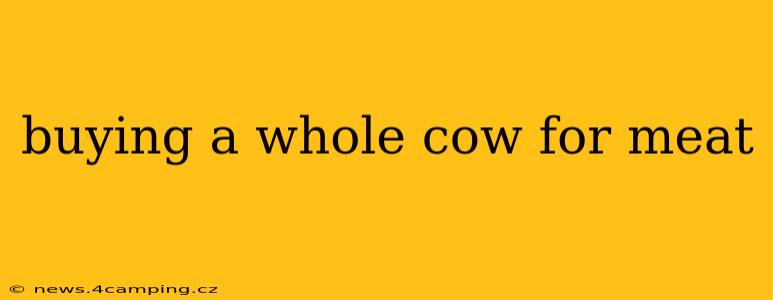Buying a whole cow might seem daunting, but it can be a rewarding experience, offering significant cost savings and access to high-quality, ethically raised meat. This guide covers everything you need to know before taking the plunge.
What are the benefits of buying a whole cow?
This is a frequently asked question, and for good reason! The primary benefit is the cost savings. Purchasing a whole or half cow is significantly cheaper per pound than buying retail cuts. You also gain control over the quality and origin of your meat. You can work directly with a farmer, ensuring the cows are raised humanely and ethically, often with access to pasture and a healthier diet than commercially produced beef. Finally, you get a greater variety of cuts, experiencing parts of the cow you might not typically find in a supermarket.
How much does it cost to buy a whole cow?
The price varies widely based on several factors. The breed of cow, its weight, and the processing fees all contribute to the final cost. Generally, expect to pay anywhere from $3 to $6 per pound of hanging weight (the weight of the carcass before it's cut and packaged). Remember to factor in the cost of butchering and processing, which can add several hundred dollars to the total.
Where can I buy a whole cow?
Finding a local farmer selling whole cows is usually the best approach. Start by contacting your local farmers' markets, agricultural extension offices, or searching online for "local beef farmers" near you. Many farms offer pick-up or delivery options, and some even provide customized cuts based on your preferences.
What do I do with all that meat?
This is a common concern. A whole cow yields a substantial amount of meat – often 400 to 800 pounds or more, depending on the size of the animal. Proper storage is crucial. Consider a large freezer (or multiple freezers) to accommodate the quantity. Plan your meals strategically and consider portioning and packaging the meat for efficient storage. You can also share the meat with friends, family, or even neighbors.
How do I choose a butcher?
Selecting a reputable butcher is essential to ensure your meat is properly processed and packaged. Ask your farmer for recommendations, or research local butchers online. Read reviews and inquire about their experience with processing whole cows, their hygiene practices, and their cutting techniques.
What cuts of meat will I get from a whole cow?
You'll receive a wide variety of cuts, including steaks (ribeye, sirloin, tenderloin), roasts (chuck, brisket, rump), ground beef, stew meat, short ribs, and many more. The exact cuts and quantities depend on the butcher's practices and the size of the cow. Don't hesitate to discuss your preferences with your farmer or butcher.
Can I buy just half a cow?
Absolutely! Many farmers offer the option of buying half a cow, which is a great way to get a significant amount of meat without the commitment of a whole cow. This still offers considerable savings compared to retail prices and allows you to enjoy a diverse selection of cuts.
Is buying a whole cow worth it?
The decision depends on your circumstances. If you have the freezer space, the desire for high-quality, ethically raised meat, and are looking for significant cost savings, buying a whole or half cow can be a fantastic choice. However, consider the time commitment involved in storage, preparation, and potentially sharing or preserving the meat. Weigh the pros and cons carefully before making a decision.
This comprehensive guide should help you navigate the process of buying a whole cow for meat. Remember to do your research, ask questions, and enjoy the rewards of this rewarding experience!
